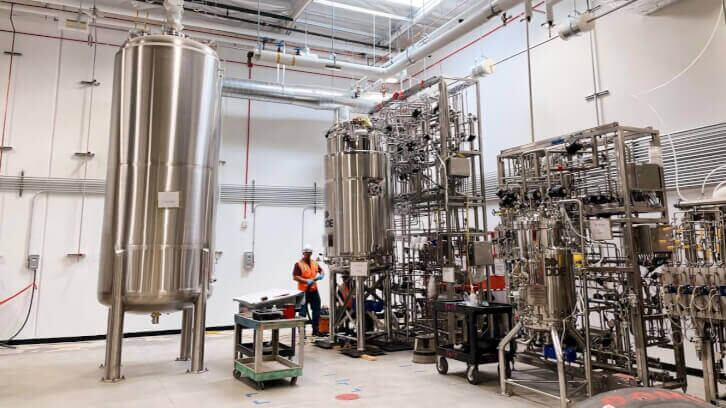The facility will house bioreactors that can hold up to 10,000L of Plenty and bovine cells to produce Omeat’s ground beef.
The company announced its proprietary alternative to fetal bovine serum (FBS), Plenty, over the summer, which promises a more affordable and effective growth factor.
Omeat’s chief technology officer, Jim Miller, described the pilot plant’s capabilities as “an integrated, farm-to-table supply chain.”
Once the plasma is collected from Holstein cows on Omeat’s farm, it’s transported to the pilot facility where it’s used to derive Plenty. Inside the bioreactors, Plenty and plasma are combined and scaled for commercial use.
The plant will also provide data and insights required for scaling up production to ensure the company meets the highest standards for quality, taste and safety.
Omeat’s team elaborated further to FoodNavigator-USA of the facility’s data insights, which includes tracking KPIs like cell density, yield and cost of goods; as well as capabilities to fully examine the cell culture’s metabolic profiling to help improve processes and identify any barriers.
“Metabolite profiling allows for the identification of metabolites that become limiting during cell culture and/or for finding bottlenecks in metabolic pathways that limit culture growth and proliferation,” the company added.
As Omeat continues its path towards regulatory approval, the pilot facility kickstarts its ability to “demonstrate the intricacies of its process at scale, establishing a clear path for regulatory review and approval.
Omeat’s founder and CEO, Ali Khademhosseini, Ph.D. expressed the implications of scaling cultivated meat at a global level, stating that the company’s methods expect to provide a more ethical, sustainable protein source.
“Omeat’s pilot plant is a major accomplishment for our company and the industry at large. We continue to push the boundaries for cultivated meat and challenge existing processes. We’re pioneering a very unique farm-to-table approach that enables us to create delicious real meat with a fraction of the resources needed to produce conventional meat. It’s a more humane and sustainable way to satisfy the growing global appetite for meat. We remain confident that at scale, Omeat’s prices will be less than conventional meat, providing accessibility to high-quality protein worldwide,” he said.




